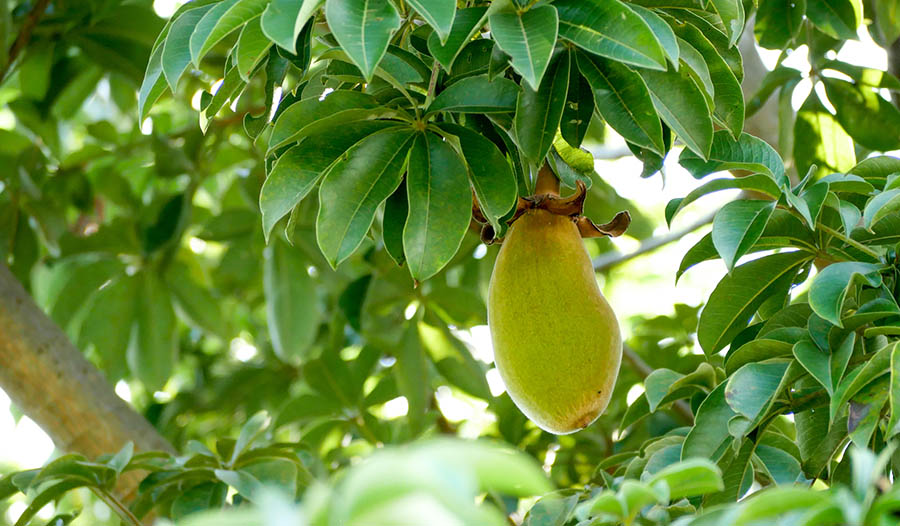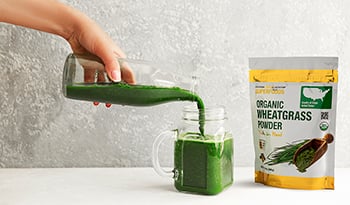The Many Benefits of Baobab Powder
DISCLAIMER:This blog does not intend to provide diagnosis...
- In this article:
- The Story Behind the Superfood
- The Benefits of Baobab Powder
- How to Use Baobab Powder
- Blueberry Baobab Superfood Smoothie Recipe
- California Gold Nutrition Superfood Baobab Powder

The baobab (pronounced BAY-oh-Bab) tree is a seemingly mythical plant, towering high above the African savanna up to nearly 100 feet tall. They are commonly called "upside down" trees or monkey bread trees. The world is finally catching wind of the incredibly nutritious fruit of this tree. These megalithic trees sustain wildlife and even the communities around them, and their 3-pound fruit is available as a health-enhancing powder that boasts a vast array of benefits.
Baobab’s fruit is extremely nutrient-dense as it is packed with vitamin C, calcium and potassium. Baobab powder comes from the dried pulp of the tree’s fruit, which is similar to coconut and has a mild citrusy flavor.
The Story Behind the Superfood
When picturing the iconic African landscape, this tree may appear in one's imagination as a silhouette against the vibrant savanna sunset. It is said to live for thousands of years, and a single tree can weigh as much as 75 tons. The baobab is the largest succulent in the world, absorbing a huge amount of water from the rainy season into its trunk. It continues to produce its nutrient-dense fruit all throughout the dry, arid season. Due to this ability, the baobab was given the nickname "the tree of life" as its fruit and water stores sustain many living things in the dry, harsh climate.
The magnificent tree is a central part of African folklore and has been used by native people for hundreds of years as a source of food, water and shelter. The hollowed trees continue to be used today as a meeting point for communities just as they were used for centuries. As baobabs age, they become naturally hollow and are used as venues, classrooms or even pubs. One pub built within a hollowed baobab tree was also carbon dated to be 6,000 years old.
The baobab is super-resilient and often referred to as indestructible or impossible to kill. The tree will regrow its bark if it is burned, and it repairs itself after being frequently stripped by the tusks of wild elephants. Fortunately for this hardy tree, elephants seem to be the only real threat they face. Unaffected by climate change or deforestation, the baobab continues to thrive. Due to their strong qualities, the baobab makes comfortable homes for humans and shelters for animals on the savanna, creating a refuge in the harsh desert environment. With such a mighty presence and responsibility for sustaining so much life, it's inevitable that myth, legends and folklore surround this amazing plant. The baobab is an ancient species of tree that dates back to 200 million years ago.
The baobab tree blossoms with large white flowers that fall and feed the native antelope. After that, the fruit grows, beginning with velvety green skin but drying eventually right on the branch. This drying phase takes place over a period of six months where the fruit is baked by the sun, and the skin forms into a hard shell, much like coconut. Amazingly, this natural drying phase produces a fruit straight from the branch that needs very little processing. Since it’s already wholly dried, it does not need to be spray-dried, freeze-dried or treated. As a result, the powder is exceptionally pure and retains its nutritional value.
The uses of baobab powder range from medicinal, reducing fevers and inflammation, to applications as a natural beauty product. Baobab is said to produce the most nutrient-dense fruit in the world. It is surprising, then, that only recently have scientists and nutritionists begun to take notice of this superfood. However, it is why many African communities choose to build their houses inside or around baobab trees.
Another positive aspect of utilizing the fruit of this beneficial tree is that there are no baobab plantations, and virtually all harvesting is done by the local families who own the trees. The tree is so abundant that the fruit mostly goes to waste. The collection, preparation and selling of the fruit benefit the communities where they grow, many of which are in poverty. The rise in baobab-based businesses is also providing a way for local women to learn the skills of becoming business owners and earn a paycheck for themselves and their children for the first time.
The Benefits of Baobab Powder
As it is the most nutrient-dense food in the world, the fruit of the baobab is a powerhouse of vitamins, antioxidants and fiber. Although every part of the tree is valuable, including the leaves, which are a rich vegetable, the fruit from which baobab powder is derived is especially potent. It is packed with six times the amount of vitamin C than an orange contains. It delivers significant levels of calcium, phosphorus and potassium, upon which the immune system, skin, bones, mood and energy levels depend.
Baobab is credited with having anti-inflammatory, anti-fever, analgesic, anti-microbial, anti-viral and anti-diarrheal properties, and it can even be used as an antidote to poison. Some of these benefits have also been studied to rival some conventional medicines in their effectiveness, such as recovery from dehydration due to diarrhea.
The high fiber levels in baobab help balance the digestive system, help a person maintain a healthy weight, help support heart health and even reduce spikes in blood sugar. The baobab is comprised of 50 percent fiber, and it provides 6 grams of fiber per serving. Since many Americans fail to meet the recommended fiber intake, baobab can help a person consume healthy levels of fiber when used daily.
Although the importance of probiotics is generally understood, many people fail to account for prebiotics in their diets. Without plentiful prebiotic fiber, the flora in one's gut may struggle to flourish. Providing the body with a substantial amount of prebiotic foods feeds the healthy bacteria that should be abundant in the digestive system. Addressing one’s gut health simultaneously supports the immune system, heart and joints. When the body's major waste disposal organ is working at its top function, the chance of many illnesses developing, may be minimized.
Baobab is also a significant source of antioxidants, containing twice the amount as goji berries. Antioxidants reduce oxidative stress on the body’s cells and help remove free radicals. That said, if people are solely getting their source of antioxidants from a supplement form, it is possible to overwhelm their bodies with this nutrient. By consuming antioxidants from a food source, individuals can avoid the potential health risks and enjoy the great benefits antioxidants offer, including the slowing of the aging process.
How to Use Baobab Powder
There are many ways to use baobab powder that are simple, easy and delicious. The fruit has a tangy, tropical flavor with a sweet citrus taste. It mixes well with other fruits and is a natural addition to many recipes. It can be added to just about anything, and its mild flavor is a nice addition to many recipes.
Baobab powder can be sprinkled onto fruit, cereal or yogurt for breakfast. It can give porridge and oatmeal extra flavor and provide a boost to a person’s morning. Those who like to bake should try adding it to cakes, cookies or loaves of bread for a healthy dose of extra fiber. It can be a great way for someone to sneak more healthy nutrition into his or her family's favorite treats. For dinners, it can be added to soups or sauces as a thickening agent. Baobab powder can even be used to make salad dressings, taking salads to another level of health.
Those who prefer to keep things simple can add it to hot water, coconut water or milk. Even fruit juice is an excellent base for baobab power. Another way to integrate ground baobab into everyday snackable recipes is to use it in energy or granola bar recipes.
Blueberry Baobab Superfood Smoothie Recipe
Baobab powder is a perfect addition to smoothies. It can help reduce fatigue, aid in recovery from exercise and provide an excellent vitamin boost in the morning. This blueberry baobab superfood smoothie recipe makes for a fresh start to the day.
Ingredients:
- 2 Tbs. California Gold Nutrition Superfoods Organic Baobab Powder
- ¼ cup cashew nuts
- 1 frozen banana
- 1 cup blueberries
- 1 cup nut milk
- 1 Medjool date
Instructions:
- Combine the ingredients in a blender.
- Blend on high for two to three minutes or until smooth.
California Gold Nutrition Superfood Baobab Powder
California Gold Nutrition Organic Baobab Powder is sourced from Africa and manufactured in the US. It's USDA-certified organic as well. The sustainably wild-sourced and sun-dried fruit pulp has a mildly sweet flavor and is available as an 8.5-ounce (240-gram) powder. It's formulated to contain no gluten or GMOs, with a 100% Gold Guarantee. It contains vitamins, minerals, phytosterols and soluble fiber, such as pectin. It pairs well with apples, bananas, carrots, cacao, oranges and sweet potatoes.




